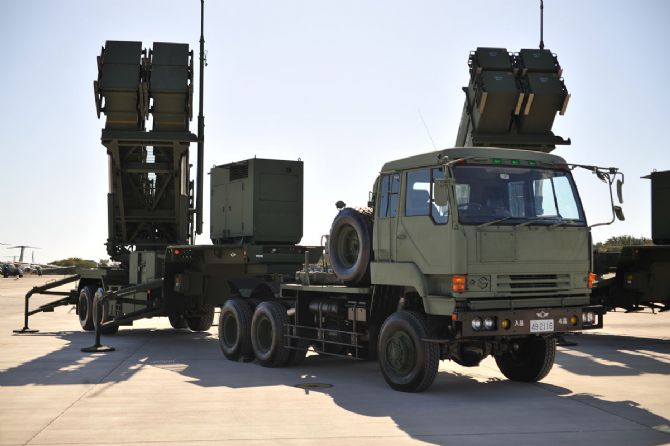
403
Sorry!!
Error! We're sorry, but the page you were looking for doesn't exist.
Turkey abandons decision to purchase Chinese missile defense system
(MENAFN- The Journal Of Turkish Weekly) Turkey has entirely dropped a tentative agreement to purchase a $3.4 billion long-range missile defense system from a Chinese company ending a two-year saga over the deal which had worriedNATOallies.
The decision was taken in the run-up to the G-20 Summit inAntalyawhen Turkish PresidentRecep Tayyip Erdoanhosted world leaders including Chinese President Xi Jinping and U.S. President Barack Obama CNN Türk reported Nov. 15.
The decision has yet to be finalized by the top Turkish government body for procurement the Defense Industry Executive Committee (SSK) but the move is expected to be announced this week with formal approval from the members of the committee chaired by Prime Minister Ahmet Davutolu. The committee’s other members are the defense minister the chief of the General Staff and the head of the defense procurement office the Undersecretariat for Defense Industries (SSM).
The talks with China’s CPMIEC on the missile deal hit a stalemate over technology transfer CNN Türk said citing anonymous sources.
After the cancellation questions remain as to how Turkey will meet its long-range air defense needs. Local defense companies such as military electronics specialist Aselsan and missile manufacturer Roketsan may be commissioned to fulfill such a mission CNN Türk said underlining that Turkey aimed to produce the system domestically with “national resources” in combination with technological support from a globally tested system.
Turkey choseChinaPrecision Machinery Import and Export Corp. (CPMIEC) as a preferred bidder for the $3.4 billion deal in September 2013 to build the missile defense system but the move prompted Western concerns about security and the compatibility of the weaponry withNATOinfrastructure.NATOcountries particularly the United States objected to the idea pointing to the fact that the systems would not be integrated with the alliance’s defense structure.
In the initial bid Eurosam came second while a U.S. partnership of Raytheon and Lockheed Martin came third.
At the time officials and industry sources told theHürriyet Daily Newsthat the Turkish government’s decision to select CPMIEC could force Turkey into ending up with a “standalone” system with little or no integration withNATOassets like radars.
About half of Turkey’s network-based air defense radars have been paid for byNATOand are part of theNATOAir Defense Ground Environment.
“Turkey can always decide to build a standalone system. But in that case abstracting the air defense system fromNATOassets would mean that Turkey will lose half of its radar capabilities” one defense analyst said at the time.
Turkey would need interface data to make its own air defense rchitecture interoperable withNATOassets primarily data on the Identify Friend and Foe system. This is a top-secret system and cannot be installed into any Chinese system.
The decision was taken in the run-up to the G-20 Summit inAntalyawhen Turkish PresidentRecep Tayyip Erdoanhosted world leaders including Chinese President Xi Jinping and U.S. President Barack Obama CNN Türk reported Nov. 15.
The decision has yet to be finalized by the top Turkish government body for procurement the Defense Industry Executive Committee (SSK) but the move is expected to be announced this week with formal approval from the members of the committee chaired by Prime Minister Ahmet Davutolu. The committee’s other members are the defense minister the chief of the General Staff and the head of the defense procurement office the Undersecretariat for Defense Industries (SSM).
The talks with China’s CPMIEC on the missile deal hit a stalemate over technology transfer CNN Türk said citing anonymous sources.
After the cancellation questions remain as to how Turkey will meet its long-range air defense needs. Local defense companies such as military electronics specialist Aselsan and missile manufacturer Roketsan may be commissioned to fulfill such a mission CNN Türk said underlining that Turkey aimed to produce the system domestically with “national resources” in combination with technological support from a globally tested system.
Turkey choseChinaPrecision Machinery Import and Export Corp. (CPMIEC) as a preferred bidder for the $3.4 billion deal in September 2013 to build the missile defense system but the move prompted Western concerns about security and the compatibility of the weaponry withNATOinfrastructure.NATOcountries particularly the United States objected to the idea pointing to the fact that the systems would not be integrated with the alliance’s defense structure.
In the initial bid Eurosam came second while a U.S. partnership of Raytheon and Lockheed Martin came third.
At the time officials and industry sources told theHürriyet Daily Newsthat the Turkish government’s decision to select CPMIEC could force Turkey into ending up with a “standalone” system with little or no integration withNATOassets like radars.
About half of Turkey’s network-based air defense radars have been paid for byNATOand are part of theNATOAir Defense Ground Environment.
“Turkey can always decide to build a standalone system. But in that case abstracting the air defense system fromNATOassets would mean that Turkey will lose half of its radar capabilities” one defense analyst said at the time.
Turkey would need interface data to make its own air defense rchitecture interoperable withNATOassets primarily data on the Identify Friend and Foe system. This is a top-secret system and cannot be installed into any Chinese system.

Legal Disclaimer:
MENAFN provides the
information “as is” without warranty of any kind. We do not accept
any responsibility or liability for the accuracy, content, images,
videos, licenses, completeness, legality, or reliability of the information
contained in this article. If you have any complaints or copyright
issues related to this article, kindly contact the provider above.

















Comments
No comment